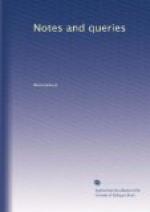“Beryan Erde,
Oyn and Perde!”
* * * * *
“A whistling Wife” &c.—I can supply another version of the couplet quoted in “Folk Lore” (Vol. ii., p. 164.), which has the merit of being more rhymical and mysterious. In what district it was current I know not.
“A whistling wife and a crowing
hen
Will call the old gentleman out
of his den.”
G.L.B.
A Charm for Warts.—In some parts of Ireland, especially towards the south, they place great faith in the following charm:—When a funeral is passing by, they rub the warts and say three times, “May these warts and this corpse pass away and never more return;” sometimes adding, “in the name of the Father, Son, and Holy Ghost.”
Jarltzberg.
"Hanging out the Broom".—Besides the instance given by Mr. R.F. Johnson (Vol. i., p. 384.), perhaps some of your readers can inform me of the origin of a somewhat similar custom, applicable to all ships and vessels for sale or hire, by the broom (all old one being generally used) being attached to the mast-head: if of two masts, to the foretop-mast head.
WP.
* * * * *
Lord Plunket and Saint Agobard.
Some of your readers may remember a speech in parliament by, as I think, Lord Plunket, in which his lordship argued with great eloquence in behalf of the Bill for the Emancipation of the Roman Catholics. Among many passages therein of equal truth and rhetorical power, there was one long afterwards much quoted, paraphrased, and praised. It was that in which he reminded the House, that those for whom he pleaded were fellow-subjects of the same race, offspring of the same Creator, alike believers in the One true God, the equal recipients of His mercies, appealing for {227} His blessings though the medium of the same faith, and looking forward for salvation to the One Intercessor, Mediator, and Sacrifice for all,—men, who, as they did, addressed the Eternal in the form of that “Universal prayer”—Our Father—the authority and the privilege of one common parentage, offered by the all in the union of the same spirit, in the conviction of the same wants, in the aspiration of the same hope. I say, I think Lord Plunket so spoke, for I write from memory dating from the period when George the Third was king. Now be this so: according to the dogmas of some critics, Lord Plunket may be convicted of an eloquent plagiary. Read the following extract from a missive by S. Agobard, to be found in the Bibl. Vet. Patrum, tome xiii, page 429., by Galland, addressed “Ad praefatum Imperatorem, adversus legem Gundobadi et impia certamina quae per eam geruntur,” and say whether, in spite of the separation of centuries, there does not appear a family likeness, though there were no family acquaintance between them; Saint Agobard being Bishop of Lyons in the ninth centry, and Lord Plunket Attorney-General for Ireland in the nineteenth.




